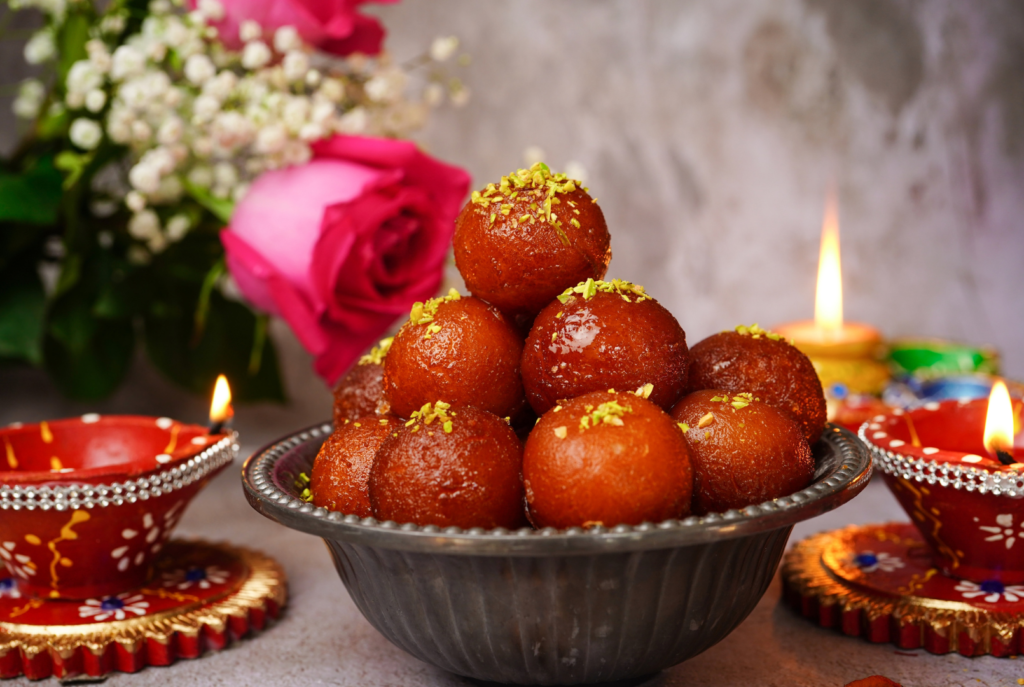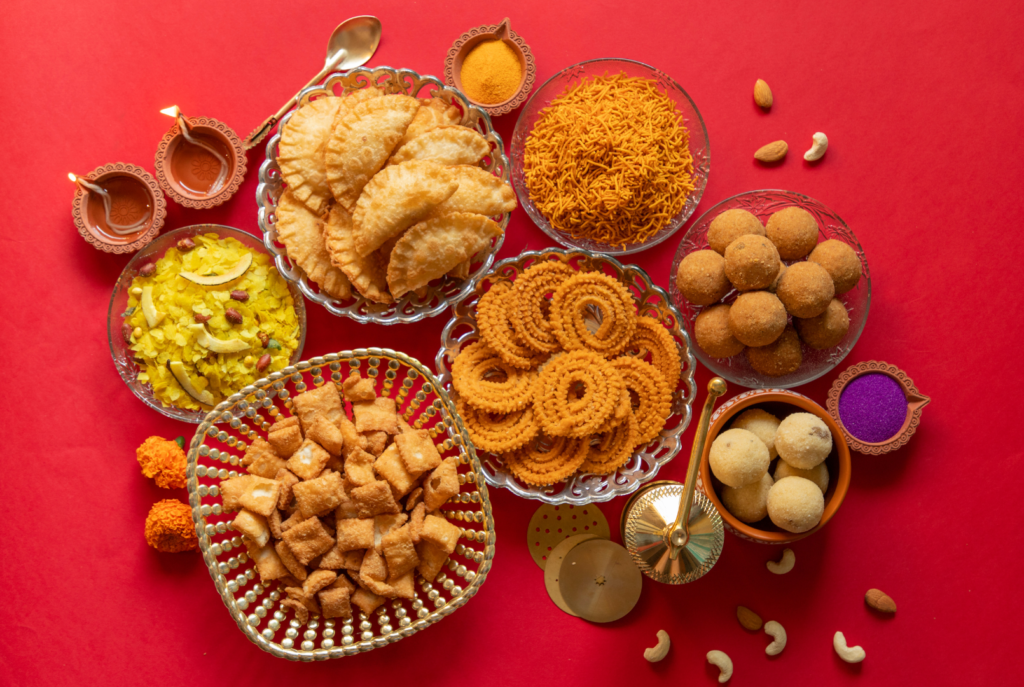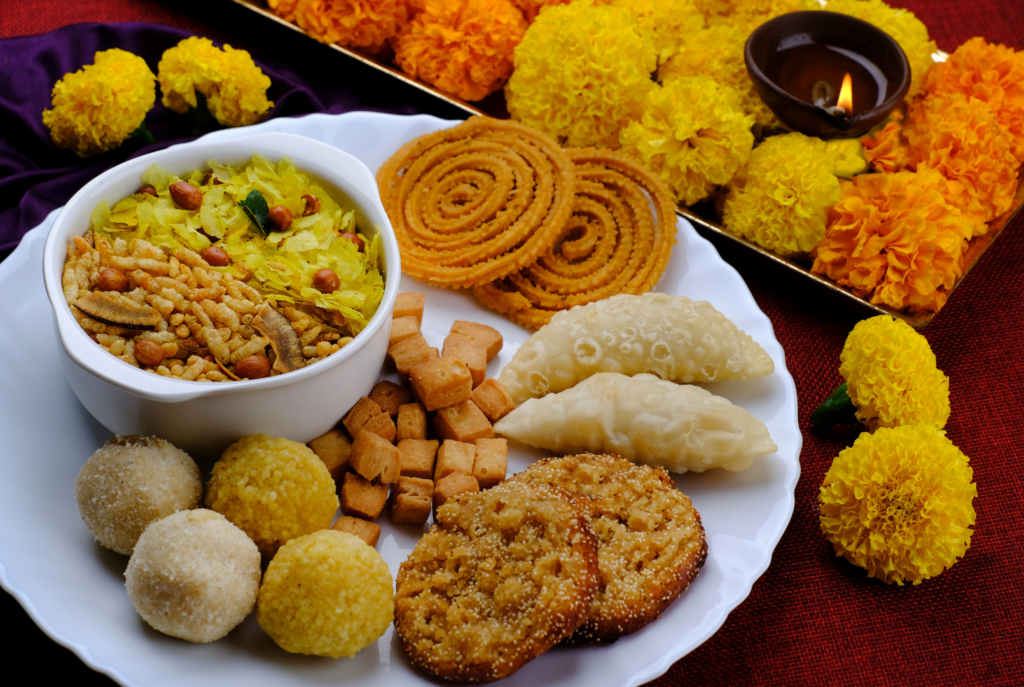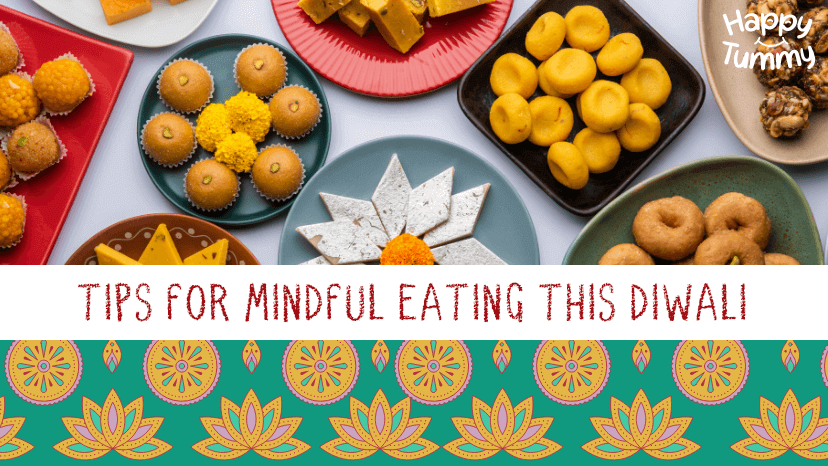

Table of Contents

Diwali, known as the festival of lights, is a time of joyous celebration, family gatherings, and of course, delectable food. From sweets to savory treats, the abundance of food often leads to overeating, leaving many feeling bloated, sluggish, or uncomfortable. Overindulgence, while easy to slip into, can be avoided with a few simple strategies. By incorporating mindful eating practices and making healthier choices, you can enjoy Diwali’s festivities without compromising your well-being. Here’s a comprehensive guide on how to avoid overeating during Diwali so you can feel light and energized throughout the celebrations.
The importance of mindful eating during festivals

Mindful eating is the practice of being fully aware and present during a meal, savoring each bite, and recognizing the signs of fullness and satisfaction. This approach can greatly enhance your experience of food, reduce digestive discomfort, and prevent the urge to overeat. Especially during Diwali, when feasts can feel like a marathon of sweets and snacks, staying mindful can make a significant difference.

Tips for Balanced Festive Feasts
Start with Small Portions
During Diwali, it’s easy to overload your plate, especially at gatherings where a variety of dishes are available. Starting with smaller portions helps you try everything you’d like without overfilling your stomach. Begin by placing small portions on your plate and savor each one slowly. Not only does this allow you to appreciate every bite, but it also gives your body time to process fullness. This way, if you want a second helping, you can do so without feeling overly stuffed.
Savor Your Food Slowly
Eating slowly gives your body time to register feelings of fullness, helping prevent overeating. When you eat too quickly, it’s easy to miss the signals that you’re no longer hungry. Take small bites, chew each one thoroughly, and enjoy the textures and flavors of the food. This not only helps you stay in tune with your hunger but also adds to the enjoyment of each bite. Remember, meals aren’t a race; they’re an opportunity to connect with food and nourish your body.
Hydrate Well Before and During Meals
Drinking water before meals can be a powerful tool for preventing overeating. Many times, what we think is hunger is actually thirst. Staying hydrated throughout the day can curb unnecessary hunger pangs and help you make mindful choices. Consider drinking a glass of water 10-15 minutes before eating, and continue sipping water throughout your meal. This not only aids digestion but also helps in controlling portion sizes, as your body will feel fuller more quickly.
Include More Fiber
Fiber-rich foods like fruits, vegetables, salads, and whole grains can help you feel full without overloading on calories. Including fiber in your meals can help you stay satisfied for longer and control blood sugar levels, which is especially beneficial when indulging in festive treats. Add a serving of salad, fruits, or whole grains to your plate. Not only will this make you feel more satiated, but fiber also supports digestion, keeping you comfortable even after a larger meal.
Don’t Skip Meals
A common mistake is to skip meals in anticipation of a Diwali feast, thinking that it’ll “make room” for extra food later. However, this often backfires. Skipping meals leads to heightened hunger, which can make it challenging to practice portion control when food is finally available. Instead, eat balanced, smaller meals throughout the day to maintain stable blood sugar levels. This approach makes it easier to enjoy a reasonable portion at Diwali dinner and avoid the urge to overeat.
Choose Baked Over Fried
Many traditional Diwali treats are fried, which increases their calorie content significantly. Opting for baked versions of your favorite snacks can be a healthier choice that still satisfies your cravings. Baked treats tend to be lower in calories and fat, yet they can be just as delicious. You could try baked samosas, baked sev, or vegetable patties, which are flavorful and far lighter than their fried counterparts. By making this simple swap, you can enjoy your treats guilt-free.

Focus on Protein-Rich Snacks
Protein is essential for keeping you feeling full and satisfied, which is crucial when surrounded by tempting foods. Including protein-rich options such as nuts, yogurt, chickpea salads, or lentil-based snacks like moong dal chilla can help curb your appetite and reduce the tendency to snack mindlessly. Protein has the added benefit of stabilizing blood sugar levels, which helps manage cravings for sweets and other high-carb snacks.
Avoid Sugary Beverages
Sugary drinks like soda, juices, and sweetened teas can significantly increase your calorie intake without offering any real satiety. Drinking these beverages can also spike blood sugar levels, leading to increased cravings. Instead, opt for water, unsweetened herbal teas, or sparkling water with a splash of lemon or mint. Not only will you avoid excess calories, but these choices are refreshing and hydrate your body.
Use Smaller Plates
Studies have shown that using smaller plates can help you control portions. A smaller plate can create the illusion of a fuller meal, which can trick your brain into feeling satisfied with less food. This approach is especially useful at buffets or gatherings where multiple dishes are served. By using a smaller plate, you’re more likely to serve yourself reasonable portions, and you’ll be less inclined to go overboard.
Set an Eating Cut-Off Time
Setting a specific time to stop eating in the evening can help prevent late-night snacking, which can disrupt digestion and sleep. Decide on a time for your last meal, ideally a couple of hours before bed. This helps your body stick to a healthy rhythm, allowing for better digestion and restful sleep. Late-night eating can often lead to unnecessary snacking, which may cause discomfort and interrupt your sleep cycle.

Tips for Mindful Eating during Diwali

Diwali is a festive occasion filled with delicious foods, but it’s also a time when many people struggle with overeating.
Here are 10 practical tips to help you enjoy the festivities while maintaining mindful eating habits.
- Plan Your Meals: Before attending any festive event, plan your meals for the day. This helps control portions and avoid impulsive eating.
- Eat Slowly and Savor: Take your time with each bite. Eating slowly allows your brain to register fullness, which can prevent overeating.
- Stick to Regular Eating Patterns: Try to maintain consistent meal times even during the festivities. This helps regulate hunger and reduces the temptation to snack excessively.
- Control Portion Sizes: Use smaller plates or bowls to help visualize appropriate serving sizes. Be mindful of how much you are serving yourself, especially with high-calorie treats.
- Stay Hydrated: Drink plenty of water throughout the day. Staying hydrated can help differentiate between hunger and thirst, reducing the likelihood of overeating.
- Choose Healthier Options First: Fill your plate with nutrient-dense foods like fruits, vegetables, and lean proteins before indulging in sweets and fried items. This ensures you get essential nutrients while keeping calorie intake in check.
- Practice Mindful Indulgence: When enjoying sweets or rich foods, choose one or two favorites and savor them instead of sampling everything available. This approach allows you to enjoy the flavors without overindulging.
- Avoid Distractions While Eating: Focus on your meal by avoiding distractions like TV or phones. This helps you pay attention to how much you’re eating and increases satisfaction with smaller portions.
- Stay Active: Incorporate physical activities into your celebrations, such as walking or dancing. Staying active can help balance out the extra calories consumed during festive meals.
- Listen to Your Body: Pay attention to your body’s hunger cues. If you feel full, stop eating even if there’s more food available. Avoid feeling pressured to finish everything on your plate.
By following these tips, you can enjoy the rich traditions of Diwali while maintaining a healthy approach to eating during this festive season.
Dietitian’s Desk
Embracing Diwali with a balanced approach enhances the festive experience without compromising on health. By practicing mindful eating, savoring each moment, and selecting balanced portions, you can enjoy the celebration fully without feeling weighed down. As Dt. Anup Agharwal says, “Healthy eating during festivals doesn’t mean restrictions; it’s about making choices that honor both tradition and well-being.”

FAQs
What is mindful eating, and why is it important during Diwali?
Mindful eating involves being fully present and aware while eating, allowing you to enjoy your food and recognize feelings of hunger and fullness. During Diwali, this practice helps prevent overeating amid the abundance of festive foods.
How can starting with small portions help avoid overeating?
Starting with small portions allows you to sample a variety of dishes without overloading your plate. This approach helps your body recognize fullness and enables you to enjoy your favorites without excessive indulgence.
Why should I savor my food slowly during the festivities?
Eating slowly gives your body time to process hunger signals and feelings of fullness. It enhances your enjoyment of flavors and textures, reducing the likelihood of overeating.
How does hydration affect my eating habits during Diwali?
Staying hydrated can curb feelings of hunger, as thirst is often mistaken for hunger. Drinking water before and during meals helps control portion sizes and supports digestion.
What types of foods should I focus on during Diwali to feel satisfied?
Incorporate fiber-rich foods (like fruits, vegetables, and whole grains) and protein-rich snacks (like nuts and yogurt) into your meals. These foods help keep you full and stabilize blood sugar levels.
Is it okay to skip meals on the days leading up to Diwali feasts?
Skipping meals can lead to heightened hunger, making it more challenging to practice portion control. It’s better to eat balanced, smaller meals throughout the day to maintain stable energy levels.
What are some healthier alternatives to traditional fried snacks?
Opt for baked versions of your favorite snacks, such as baked samosas or vegetable patties. These options are typically lower in calories and fat while still being delicious.
How can I manage my cravings for sugary beverages during celebrations?
Instead of sugary drinks, choose water, herbal teas, or sparkling water with a splash of citrus. These options hydrate without adding excess calories.
What are some strategies to avoid late-night snacking during Diwali?
Set a specific time for your last meal and stick to it. This helps regulate your eating schedule, allowing your body to digest properly and reducing the temptation to snack late at night.
How can I make mindful eating a habit beyond the festive season?
Practice being present during meals by focusing on your food and minimizing distractions. Gradually incorporate mindful eating techniques into your daily routine to make it a sustainable habit for healthier eating all year round.

🎯 10+ years of Experience
🎓 10k+ Trained ( 📍 Jaipur )
💪 Helping change people’s lives
🌿 Most trusted lifestyle counselor
